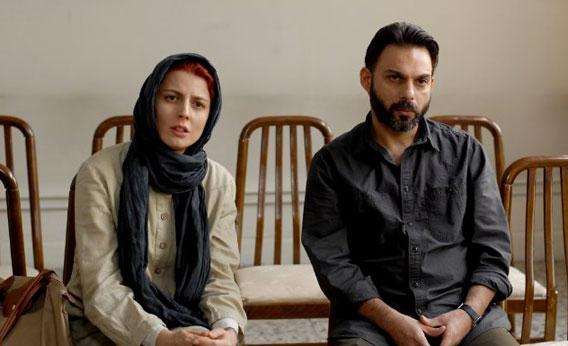It’s fitting that its release comes in the midst of the end-of-year frenzy for rating and ranking and listing, because the Iranian director Asghar Farhadi’s A Separation serves as a quiet reminder of how good it’s possible for movies to be. You don’t always have to sacrifice complexity for suspense, or formal sophistication for visceral power. It’s possible, if rare, to come across a movie that has it all.
A Separation is a domestic drama in the strict sense: It takes place mainly inside the apartment of one family, a middle-class couple named Simin (Leila Hatami) and Nader (Peyman Maadi) who have a 10-year-old daughter named Termeh (Sarina Farhadi). Simin is in the process of beginning divorce proceedings against her husband: She’s obtained an exit visa and wants to leave Iran with their daughter and settle in the West. But Nader refuses to consider leaving behind his father, an Alzheimer’s sufferer who’s come to live with the family and requires round-the-clock care. “He doesn’t even know you’re his son!” protests Simin. “I know he is my father,” Nader responds.
At their divorce hearing, Simin and Nader are sent home by a patronizing off-screen judge: “My finding is that your problem is a small problem,” we hear him tell a furious Simin, refusing to grant the divorce until the couple can come to a mutual agreement to separate. But this family’s problems are about to get a lot bigger. When Simin moves out to live with her parents, Nader hires a caretaker, Razieh (Sareh Bayat) to look after his father during the day. This devout young mother is soon overwhelmed by the task of attending to a man who can no longer speak, dress, or wash himself. One afternoon, for reasons that aren’t clear at first, she leaves the old man alone while she runs an errand. The consequences of that act—and of Nader’s outburst when he comes home to find his father unattended—will eventually spiral into personal and legal disaster for both families, Nader’s and Razieh’s.
As plot summaries go, that’s a sketchy one, but I’ll leave it there, since one of A Separation’s great strengths is the way it gradually reveals the complicated half-truths and strategic evasions in each party’s version of the story. In a way, this is also a legal procedural, but one in which the truth becomes less and less clear-cut as the film goes on. As the battle between the two families escalates—with Simin taking the side of her estranged husband, and Razieh’s hotheaded husband Hodjat (Shahab Hosseini) forcefully intervening on behalf of his terrified wife—we get a sense of the complex web of social forces determining these characters’ choices. The better-off couple is secular and cosmopolitan, dismissive of the poorer family’s traditional Islamic values. But whatever their class or education level, the women—even the fiercely independent, plain-spoken Simin—are subject to the ever-present constraints of institutionalized sexism and social shame. When the judge who’s just forbidden Simin to divorce without her husband’s permission questions why an Iranian mother might aspire to bring up her daughter elsewhere, Simin’s sidelong glare says it all.
A Separation isn’t worth watching only as a precise sociological analysis or a political critique of contemporary Iran—those qualities would be cold comfort indeed if they didn’t exist in the context of a sad, funny, suspenseful story about love, grief, and the search for justice. The ensemble cast—especially Maadi as the harried, short-tempered, ethically conflicted Nader—is extraordinary. As has become a tradition in Iranian cinema, the child characters are not just props but essential participants in the story, and both young actresses—Sarina Farhadi, the director’s daughter, as the wise-beyond-her-years Termeh and Kimia Hosseini as the caretaker’s observant, saucer-eyed little girl—deliver impeccable naturalistic performances.
Despite some conflict between Farhadi and government censors while the film was being made, A Separation has now been released to acclaim within Iran and named the country’s official entry for the foreign-language Oscar. This is a dense, complex film that demands close attention from its audience (and richly rewards a second viewing). With one of Iran’s major living filmmakers, Jafar Panahi, currently in prison for his support of the opposition movement, and another, Abbas Kiarostami, now working abroad (this year’s Certified Copy is finally getting him the wider recognition he’s long deserved here), it’s a joy to see that there are still films of this caliber being made in that curiously cinematic country. It’s my New Year’s wish that even viewers who’ve never bought a ticket to a subtitled film in Farsi will give A Separation a chance.
